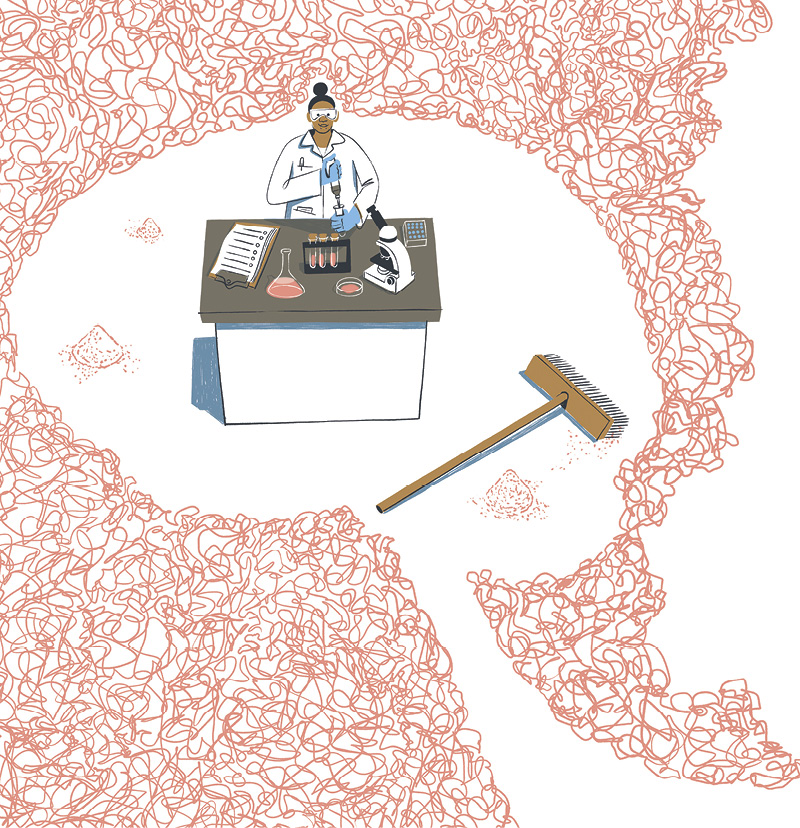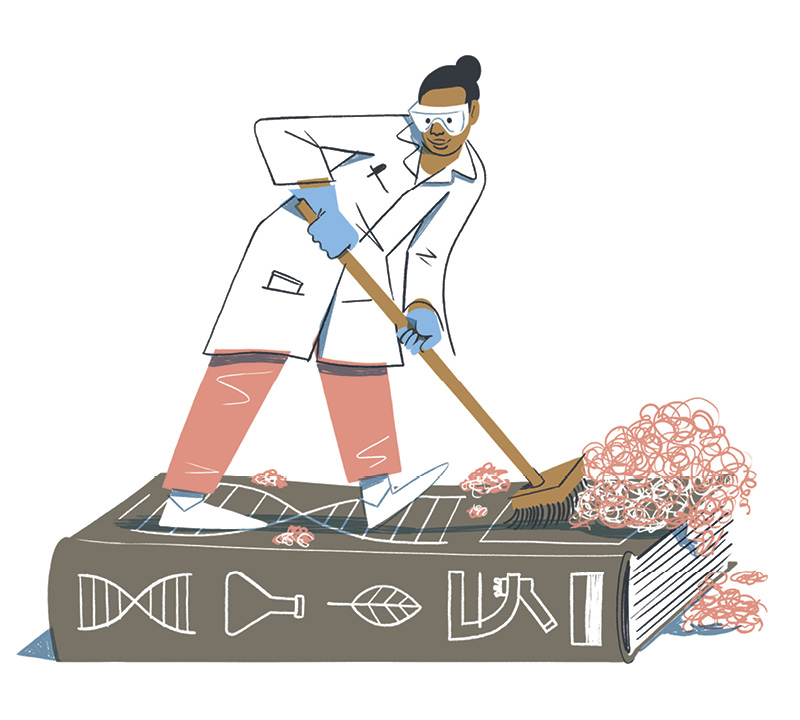
Head space
By Patrick Monahan
Illustration by Drew Lytle
A new grant is helping SF State’s scientists of tomorrow focus less on making ends meet and more on cutting-edge research
Wilmer Amaya-Mejia had done the math. Halfway through the second year of his San Francisco State University master’s degree — at a time when he should be wrapping up his research and looking ahead to his Ph.D. — his loan money would run out. Instead of taking a victory lap, he would be scrambling. Just when he thought he’d have to rethink his doctoral plans, an academic lifeline kept his dream afloat: a scholarship funded by the Genentech Foundation.
“It was a lifesaver,” he says. “It takes such a huge weight off your shoulders. Now I can really just focus on actively pursuing my research.”
The same program that Amaya-Mejia benefited from has recently been expanded in a big way. Thanks to a $10.45 million grant from the Genentech Foundation, the largest ever awarded by the organization, the number of San Francisco State students funded each year will balloon from five to more than 100 the next five years.
“This grant is a signal communicating to the broader public that this institution is doing a good job training our students, that we’re developing the caliber and the skillsets that the workforce needs,” says Carmen Domingo, dean of SF State’s College of Science and Engineering (CoSE). “The scholarship is all about opening up some space in the day-to-day existence of students so that they can spend time to learn how to think about science in the way that scientists do, learn how to work with equipment and develop professional skills so they’re really competitive when they enter the job market.”
The result will be more well-trained young scientists coming out of SF State into a booming Bay Area biotech industry that desperately needs them, Domingo says.
Return on investment
To understand the program’s origin, you have to go all the way to the top: to former U.S. President Barack Obama. Over a decade ago, SF State Professor of Biology Frank Bayliss (now an emeritus professor) received a Presidential Award from Obama for his years of success training students from underrepresented groups through SF State’s Student Enrichment Opportunities (SEO) office. The Genentech Foundation, looking for ways to diversify the life sciences workforce in the Bay Area, caught wind and reached out to Bayliss to discuss setting up a scholarship.
Since then, the Genentech Foundation has funded a program providing scholarships each year to second-year CoSE master’s students. Of the 55 recipients to date, 50 have gone on to Ph.D. programs at such schools as Harvard, Stanford and the California Institute of Technology — and they don’t stop there. “They’re getting into the best schools, and their Ph.D. completion rate is almost double the national completion rate,” says Bayliss. “All of these students have a passion for research.”
It was those successes that convinced the Genentech Foundation to dramatically scale up its investment in SF State. “San Francisco State University has a talented and diverse faculty and student body as well as a long history of creating programs that help these students succeed,” says Carla Boragno, Genentech Foundation board chair and senior vice president and global head of engineering and facilities, Pharma Technical Operations. “We are very proud to expand our partnership with San Francisco State to impact even more students earlier in their academic journey.”
“They’re getting into the best schools, and their Ph.D. completion rate is almost double the national completion rate.”
—Emeritus Professor of Biology, Frank Bayliss
A chance to blossom
Like many SF State students, Amaya-Mejia comes from a background that made navigating the already difficult path to a science career even harder. He was the first in his family to go to college, he’s Latino and gay, and he worked two jobs through his undergraduate degree at Virginia Commonwealth University. At the time, he could barely afford to spend a few hours in a research lab each week.
Now, relieved of the pressure and stress of struggling to make ends meet, Amaya-Mejia is getting ready for a Ph.D. program at the University of California, Los Angeles in the fall.In the meantime, he’s juggling multiple research projects as part of his M.S. in Ecology, Conservation and Evolutionary Biology while mentoring five undergraduate researchers. “That’s also something I’ve been able to dedicate more time to,” he says. “I want to make sure they have the resources to ask questions and learn what it’s like to do science — what I wish I had been able to do as an undergrad.”
The new program makes more of such resources available to undergraduates by supporting students as early as their freshman year instead of just supporting graduate students. That’s crucial, says master’s student Imani Robinson. In her first two years at SF State as an undergraduate, she commuted an hour each way to campus and had work commitments that prevented her from participating in lab research. “I really admire the new effort to reach out to the younger undergraduates,” she says. “I felt like if I had found it just a little bit sooner, I could have gotten a lot of enrichment out of it.”
These are familiar stories to Domingo. Time and time again, she sees talented and motivated students who lack only the time and financial resources to fulfil their potential. When they’re given those resources? “They just blossom,” she says. “That was already there in them, but they could never flower. All they needed was a little bit of water.”

More than just money
While the financial support is undeniably important, students who are awarded scholarships funded by the Genentech Foundation receive much more than money. One crucial element, especially for a group in which more than two-thirds of juniors and seniors are the first in their family to go to college, is guidance.
“We’re right here in their backyard. Students just need to know that the industry believes in them.”
—Carmen Domingo, Dean, College of Science and Engineering
Scholarship students will receive structured mentorship and take classes on research and professional development. For second-year master’s students, that means a laser focus on honing their applications to Ph.D. programs. Professional development classes in the program attract recruiters from top-rated research universities who, drawn by the reputation of SF State’s master’s programs, visit campus to meet the students.
“We get everybody: Harvard University, New York University, a lot of UCs, you name it,” says Megumi Fuse, a professor of Biology at SF State and the director of the SEO office. Fuse also works with the students on their applications, helping them highlight the aspects of their life stories that will help Ph.D. programs see their best side. “I think it’s really empowering for the students,” she says.
Students’ professional development doesn’t just happen on campus. They also get the opportunity to go to conferences in their field to network and exchange ideas face to face. “Being able to go to a scientific conference where there’s people from all over the world, different perspectives and techniques that you can only experience by meeting with these people — that is important for your development as a scientist and a student,” says former Genentech Foundation Dissertation Scholar Austin Murchison (B.S., ’17; M.S., ’19), now a Ph.D. student at Stanford University.
And even after they take their next steps, SEO students say they’ve found a lasting sense of community among program alums, providing a peer support group to get them over the inevitable bumps in the road.
Talent in tech’s backyard
Domingo has overseen a push in CoSE to tailor programs to what Bay Area companies are looking for in their employees, such as interdisciplinary skills and experience with “big data.” An M.S. in Statistical Data Science was launched in the Spring 2020 semester, and a graduate certificate in Ethical Artificial Intelligence saw its first semester in Fall 2019. And some funding from the Genentech Foundation will go to participants in Promoting Inclusivity in Computer Science (PINC) summer workshops, where students studying primarily biology and chemistry learn programming skills.
The new funding from the Genentech Foundation will also open the program to students who want to pursue pre-professional degrees (like M.D.s) or go directly into industry after graduating, as well as making it available to students studying a wider range of subjects. “The way that the prior program was structured, it was funding students in the biological sciences, which is great,” Domingo says. “But these industries need engineers, they need computer scientists, they need data scientists. They need people with a broad range of scientific skillsets. Now this program is a lot wider.”
SF State is already positioned to meet one key need of Bay Area companies — the need for diverse employees. In CoSE, for instance, 43% of enrolled students are from underrepresented groups. “The student body at SF State is far more diverse than the current life sciences workforce, creating an opportunity to significantly expand the pipeline of talent here in the Bay Area,” says Kristin Campbell Reed, senior director of Genentech Corporate & Employee Giving and executive director of the Genentech Foundation.
Over the past decade, students in the SEO program have gone on not only to Ph.D. programs but to positions in biotech companies across the Bay Area like Gilead, BioMarin and Genentech itself. And that number is poised to rise. What the University’s partnership with the Genentech Foundation shows, Domingo says, is that Bay Area companies don’t have to scour the world for diverse, skilled and motivated employees. “We’re right here in their backyard,” she says. “Students just need to know that the industry believes in them.”